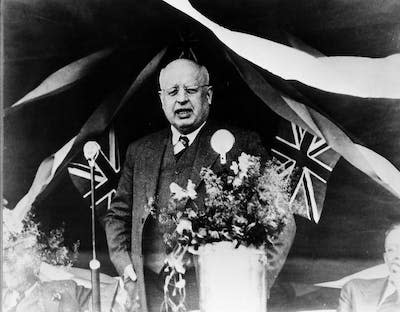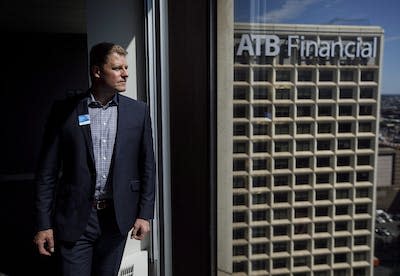#VOTENO TO FIREWALL ALBERTA 2.0
Province finalizes referendum questions
EQUALIZATION SAVED ALBERTA DURING THE GREAT DEPRESSIONAlbertans will not only be voting for their municipal leaders on Oct. 18, but also for Senate nominees, whether equalization payments should be removed from the Constitution, and whether to abolish changing clocks twice a year.
DON'T TOUCH OUR CPP OR OUR ALBERTA PENSIONS
The provincial government has not added referendum questions regarding a potential provincial police service and an Alberta pension plan, but they are further analyzing these topics before further steps are determined.
“Through the Fair Deal Panel, Albertans who are policed by the RCMP said that they want to see Alberta build its own provincial police service to improve policing in their communities” stated Kaycee Madu, minister of Justice and Solicitor General.
Madu held several town hall meetings in July to hear concerns about crime prevention in Albertan communities.
The Alberta Urban Municipalities Association (AUMA) reviewed Madu’s presentation from the meetings and believe that instead of gathering information on crime prevention, the presentation appears to be selling the idea of creating a provincial police force.
“The AUMA finds this development deeply troubling given that the government’s feasibility study has not been made available to the public,” stated the AUMA.
They believe the provincial government has already decided to create a provincial police service despite promising Albertans a referendum on the idea.
AUMA pointed out that Premier Jason Kenney assured Albertans that his government would not decide to establish an Alberta pension plan or provincial police service unless a majority of Albertans endorsed those proposals through a referendum.
A provincial police service would mean that Alberta forfeits roughly $160 million a year in federal government funding for police services through the Royal Canadian Mounted Police (RCMP).
The government is completing analysis of an Alberta Pension Plan in order for Albertans to make an educated and well-informed choice, said Travis Toews, Alberta’s minister of Finance.
“We look forward to putting this important decision on the table when the time is right,” he stated.
Turning to issues that will be on the ballot, Albertans will elect three Senate nominees to fill two vacancies and one in case of early retirement.
The Senate nominee election allows Albertans to choose the individuals who represent them in Parliament and increases senators’ accountability to Alberta voters.
Following the Senate nominee election, the Government of Alberta provides the names of the elected nominees to the prime minister for consideration of the Senate vacancies.
Between 1989 and 2012, Alberta was the only Canadian province to elect nominees for appointment to the Senate of Canada, according to the province.
The first referendum question included on the ballot this year asks Albertans if the principle of making equalization payments should be removed from the constitution.
The Government of Canada manages an equalization program to address fiscal disparities between provinces and ensure that all provincial governments can provide public services at an equal level. The program uses a formula that establishes a baseline fiscal standard; provinces that exceed the fiscal standard do not receive equalization payments and those that do not reach the fiscal standard receive equalization payments.
The fiscal standard is determined using financial indicators such as personal incomes taxes, property taxes, natural resource revenue, and others. Payments to qualifying provinces are based on individual fiscal measures in relation to the fiscal standard, and other factors like the population.
All money sent from the province to the federal level is through federal income and sales taxes.
Several other political parties in Alberta have spoken out against this referendum question, stating that the federal government is not obligated to make any changes in regards to the outcome.
Among others, the leader of the Alberta Party noted that having Albertans vote on an equalization formula, which was previously supported by Federal Minister Kenney, will not change anything.
“Even if this referendum is successful, it will have zero impact on the equalization program. Even if a clear majority of Albertans support it, the federal government has no requirement to act on it,” stated the Alberta Party in June.
Alberta has not received an equalization payment since the 1964-65 fiscal year, despite contributing more than $100 billion between 2014 and 2019 alone through federal taxes, according to the province.
The provincial government stated that the current program has many issues, including a formula that requires it to grow automatically with Canada’s economy, even if contributing provinces like Alberta are experiencing immense economic challenges.
The second referendum question asks Albertans if there should be an end to the practice of changing clocks twice a year to permanently remain on daylight saving time (DST) throughout Alberta.
Service Alberta asked Albertans in 2019 if they thought Alberta should shift to DST and 91 per cent of more than 141,000 Albertans were in favour of year-round summer hours.
As some locals have pointed out, there was little consultation on whether to change permanently to DST or standard time. Alberta’s minister of Service, Nathan Glubish, did not respond to questions around this lack of consultation.
DST is currently observed in nine provinces and two territories in Canada, with exceptions in several municipalities and Nunavut. Most of the province of Saskatchewan observes year-round Central Standard Time.
Alberta first adopted DST following a referendum in 1971. The specific wording of this year’s referendum question will be finalized this summer, the province stated.
Masha Scheele, Local Journalism Initiative Reporter, The Hinton Voice













